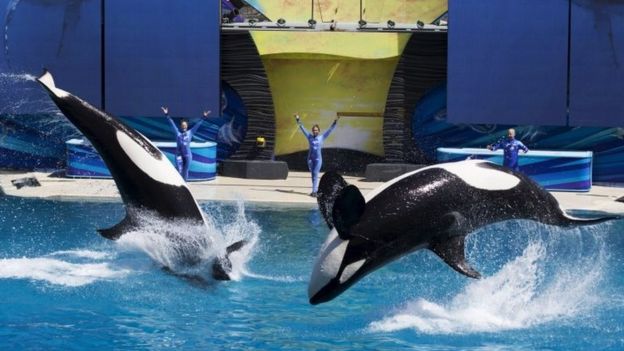SeaWorld closing its famous Orca show
January 13, 2017
SeaWorld at San Diego has decided to close its famous Orca whale show. This comes as a response to many criticisms over the years and dropping attendance numbers. Many of the criticisms come from the movie “Blackfish,” the 2013 documentary that portrayed an ugly picture of captive orcas. According to the documentary, orcas who are kept in captivity become aggressive and anxious. SeaWorld claims that the criticisms are unfounded and that vital research is being carried out in their parks. But this documentary has hit the amusement park hard. Ever since its release, attendance numbers have dropped and caused falls in revenue. The parks in Florida and Texas will also be stopping their trick shows soon.
Under the Marine Mammal Protection Act, it is now illegal to import or display orcas without passing many tests and a 30 day public comment period. California has also banned breeding animals in captivity. Because of this, SeaWorld will no longer be obtaining any new whales. But back when SeaWorld was just starting, all you really needed was about $8,000. Edward Griffin, owner of the Seattle Marine Aquarium, started the trend of orca entertainment by purchasing a 22-foot-long orca from a fisherman in British Columbia in 1965. Griffin had dreamed of riding a whale or dolphin since he was young and finally fulfilled his dream at his aquarium with his newly acquired whale, named Namu after the port Griffin bought it at. Namu lived for a year at the Seattle Aquarium. Griffin soon bought another whale and sold it second hand to SeaWorld, which had just opened in San Diego. To honor the first performing whale, SeaWorld wanted to also name this second whale Namu, but Griffin refused to part with the rights to the name. The park decided to drop the N and change the name to Shamu, a name that is still used today for the performing whales.
Just because the whales will no longer be splashing the audience or carrying humans on their backs does not mean that the whales are disappearing forever from the amusement park. SeaWorld still plans on having a show for the whales. Trainers will be kept on to teach them more natural behaviors, such as leaping out of the water instead of flipping through the air. This is necessary to keep the animals stimulated and healthy. The show, named Orca Encounter, plans to be much more informative than its predecessors. There will be information on natural history, the whales’ physical abilities, and on conservation efforts. The tank will be surrounded by artificial fir trees, cliffs, and waterfalls instead of LED screens to try and recreate the whales’ natural habitat.
















